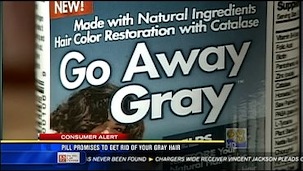Gray area: alleged hair color restorer makes news on CBS11, etc., etc., etc.
04/29/10 01:17 PM


By ED BARK
Content-sharing is hardly a phenomenon anymore. In fact it's a something of an epidemic.
In D-FW, Fox4, NBC5 and CW33 do it as part of a Local News Service (LNS) consortium. Once arch foes, The Dallas Morning News and Fort Worth Star-Telegram also share sports and/or entertainment reporting and reviews on an almost daily basis. But each paper camouflages the practice with generic "Special Contributor" identifications (and nothing more) under reporters' bylines.
Questions can and should arise about the homogenization of news under these circumstances. Which brings us to a recent spate of CBS station stories about Go Away Gray, a dietary supplement pill that supposedly can restore hair to its natural color with prolonged use. A one-month supply costs about $30.
Several readers of unclebarky.com questioned the news value of the story and whether Go Away Gray "creator" Cathy Beggan perhaps had paid stations to have her product featured. CBS11's story was by Ginger Allen, who raised questions about Going Away Gray while also reporting that it's working for some people, most notably Stephanie Swanson of Irving.
Reader Shelly Fish said in an email that she usually ignores "product plug 'health' stories," but was curious about Go Away Gray after seeing Allen's story. Her google search showed that a number of CBS stations likewise did Go Away Gray pieces.
"I get the impression that this is commonplace," she said. "Do these companies pay the networks to have their affiliates do local 'stories' on their product? If not, what goes into the decision that a particular network's affiliates will all report on a certain product?"
Her concerns were forwarded to new CBS11 news director Adrienne Roark, who responded via email.
"No, the company did not pay for this story," she said. "This was simply an idea shared by a few CBS stations."
Roark said the idea for a story on Go Away Gray came during a weekly conference call among executive producers of CBS station newscasts.
"They shared this one and like it because no one had heard of a pill to stop gray hair," Roark said. "We all try to help each other with story ideas, especially ones that we think people would like in different cities."
A google search by unclebarky.com shows that Roark's previous station, CBS-owned WFOR-TV in Miami, was among those biting on Going Away Gray. Add CBS stations in Chicago, Philadelphia, Pittsburgh, San Francisco, San Diego and Tampa Bay.
Such stories generally are customized at least a bit, although sound bites from creator Beggan were common to all of them. She's also behind a product called Wake Up On Time, which supposedly will have its users bursting with energy in no time. Not surprisingly, she thinks Go Away Gray is g-r-r-r-eat. In the pre-taped testimonial used by CBS11's Allen, Beggan said, "We get phone calls and letters non-stop from people saying, 'This is amazing. I can't believe it.' "
Allen at least went to the extent of interviewing both Irving's Swanson, a Go Away Gray devotee, and skeptical pharmacist Dr. Jennifer Fix. The latter found no evidence the product will work but also said it's probably harmless to try it. The story ended with Swanson saying she hadn't colored her hair since January, when Go Away Gray came into her life.
Other CBS reporters, particularly San Francisco's Kim Mulvihill, M.D., did no discernible work of their own. Mulvihill more or less pretended to interview Beth Skelly, a Fort Lauderdale enthusiast of Go Away Gray who likewise was featured in several other stations' reports. Her take away quote: "A woman is happy when her hair is happy."
Nutritional biochemist Jay Foster also showed up in Mulvihill's "report." In fact, he was the semi-skeptic used by every aforementioned station except CBS11.
Chicago reporter Vince Gerasole at least tried Go Away Gray on himself, and said it didn't work. But he also resorted to those canned interviews with Foster, Skelly and, of course, Beggan.
The numbing sameness of the stories -- and the free publicity given a questionable product -- may not be the principal concerns here. In this view, it's equally or more troubling when reporters such as San Francisco's Mulvihill give viewers the impression that they're actually out there interviewing people. Making it even worse, Mulvihill's post-story banter with anchors included her notation that Go Away Gray is "having a special right now. Buy one, get one free."
My hair's still graying. But now my head hurts, too.
